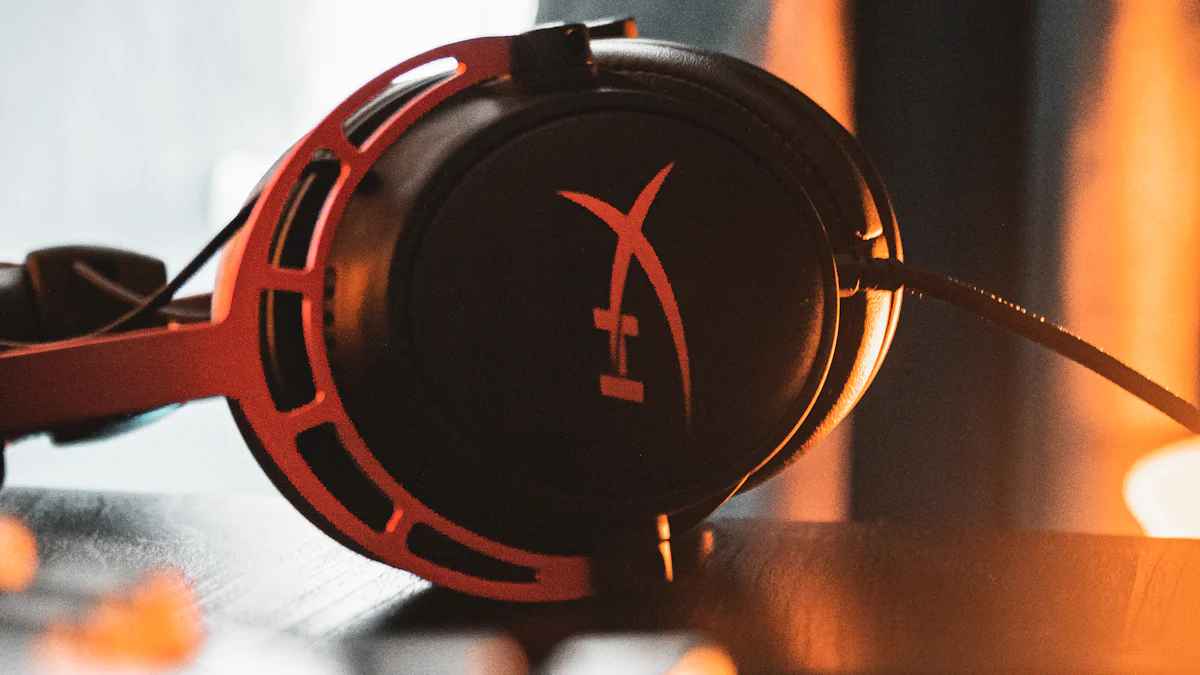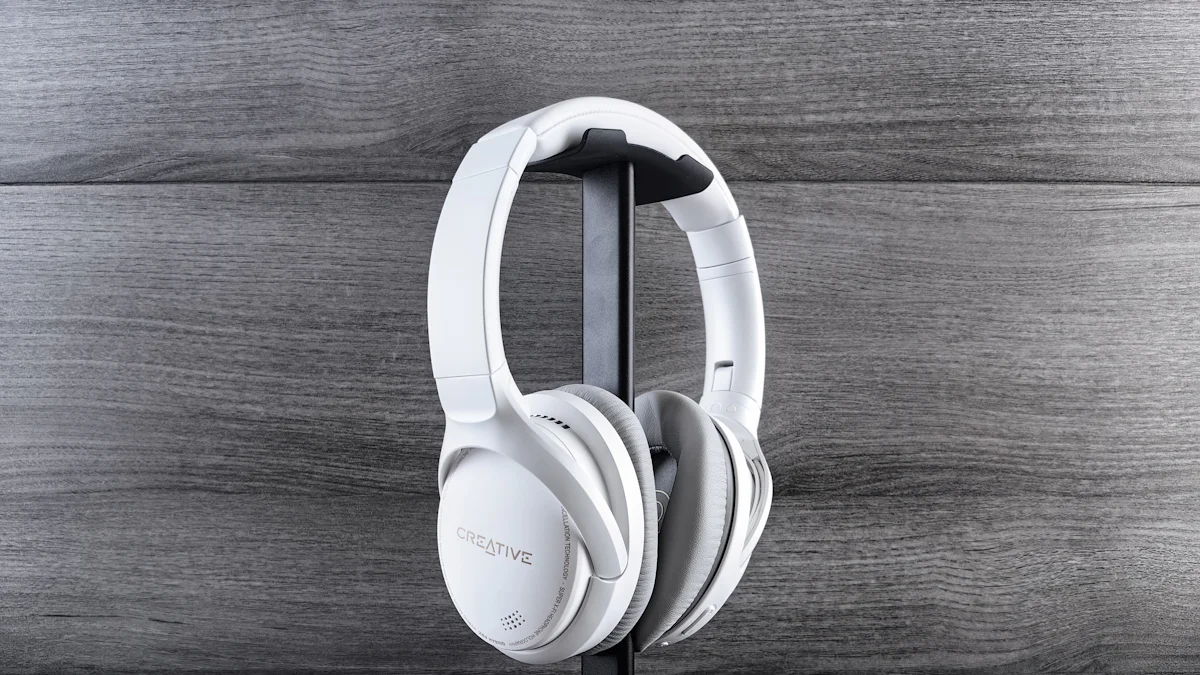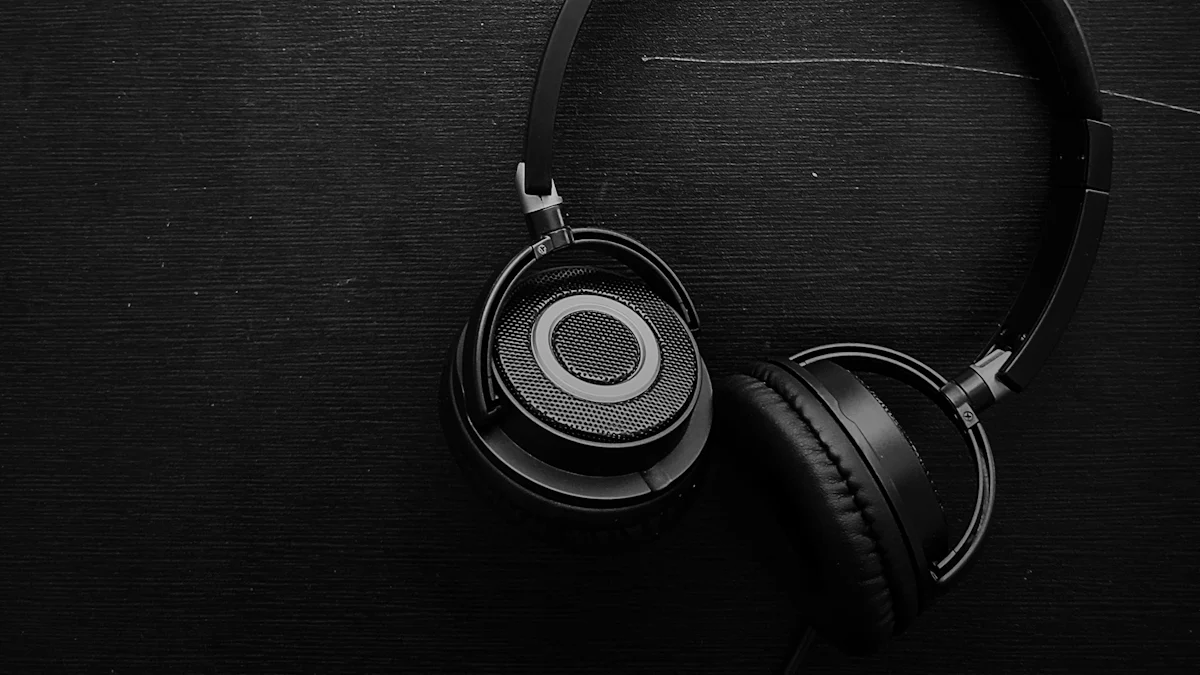Guide to the Best Noise-Canceling Headphones for Focus

Noise-canceling headphones offer a sanctuary from environmental distractions, allowing you to focus better. By filtering out background noise, these devices provide reduced sensory overload, which leads to improved attention on tasks or conversations. The demand for noise cancelling headphones has surged due to rising awareness of noise pollution's impact on health. Active noise control technology in these headphones ensures you can enjoy audio content without turning up the volume too loudly. Whether you're working, studying, or simply relaxing, the best noise-canceling headphones for focus can significantly enhance your concentration in various settings.
Key Takeaways
- Noise-canceling headphones significantly enhance focus by reducing background noise, making them ideal for work, study, or relaxation.
- Understanding the different types of noise cancellation—passive, active, and adaptive—helps you choose the right headphones for your specific needs.
- Comfort is crucial; look for headphones with cushioned ear cups and adjustable headbands to ensure a snug fit during extended use.
- Consider battery life when selecting headphones; models with 25-50 hours of battery life provide long usage without frequent recharges.
- User-friendly controls and customization options enhance your listening experience, allowing you to tailor settings to your preferences.
- Assess your primary use cases and lifestyle to find headphones that best suit your needs, whether for commuting, working, or exercising.
- Budget-friendly options are available that still offer decent noise-canceling capabilities, making it possible to find quality headphones without overspending.
Understanding Noise-Canceling Headphones

How Noise-Canceling Headphones Work
The Science Behind Noise Cancellation
Noise-canceling headphones use advanced technology to create a peaceful listening environment. They employ active noise cancelling (ANC) techniques, which involve microphones and signal processing. These microphones detect ambient sounds, and the headphones generate sound waves that are the exact opposite of these noises. This process, known as destructive interference, effectively cancels out unwanted sounds. By understanding the science behind noise cancellation, you can appreciate how these headphones enhance your listening experience.
Benefits of Noise Cancellation for Focus
Noise cancellation offers significant benefits for focus. By reducing background noise, these headphones help you concentrate better on tasks. Whether you're working in a bustling office or studying in a noisy café, noise-canceling headphones minimize distractions. This heightened sensitivity to your work environment allows you to maintain focus and improve productivity. The best noise-canceling headphones for focus provide a serene auditory space, enabling you to immerse yourself in your activities without interruption.
Types of Noise Cancellation
Passive Noise Cancellation
Passive noise cancellation relies on the physical design of the headphones to block out sound. The materials used in the ear cups and the snug fit around your ears help reduce external noise. This type of noise cancellation doesn't require any electronic components. It's effective for blocking high-frequency sounds, such as conversations or keyboard clicks. If you prefer a simpler approach, passive noise cancellation might suit your needs.
Active Noise Cancellation
Active noise cancelling is more sophisticated. It uses electronic circuitry to counteract ambient noise. As mentioned earlier, microphones pick up external sounds, and the headphones produce sound waves that cancel them out. This method is particularly effective for low-frequency noises, like the hum of an airplane engine or air conditioning units. Active noise cancelling headphones are ideal for those who need to focus in environments with constant background noise.
Adaptive Noise Cancellation
Adaptive noise cancellation takes ANC a step further by adjusting to your surroundings. These headphones analyze the noise levels in real-time and modify the noise-canceling settings accordingly. This feature ensures optimal performance in various environments, whether you're in a quiet library or a bustling street. Adaptive noise cancellation provides a personalized listening experience, enhancing your focus by adapting to your specific needs.
Key Features of the Best Noise-Canceling Headphones

Comfort and Fit
Importance of Ergonomics
When selecting noise-canceling headphones, comfort plays a crucial role. You want headphones that fit well and feel comfortable during extended use. Ergonomics ensures that the headphones sit comfortably on your head without causing discomfort. Proper ergonomics prevent strain and fatigue, allowing you to wear them for long periods. This is especially important if you plan to use them for work or study sessions.
Materials and Design
The materials and design of noise-canceling headphones significantly impact comfort. Look for headphones with cushioned ear cups and adjustable headbands. These features provide a snug fit without squeezing your head. High-quality materials, such as memory foam and breathable fabrics, enhance comfort. They also contribute to the durability of the headphones, ensuring they last longer.
Battery Life
Average Battery Life Expectations
Battery life is a key consideration when choosing the best noise-canceling headphones for focus. Most over-ear models offer 25-30 hours of battery life on a full charge. Some models, like the PX7 S2E headphones, provide up to 50 hours of battery life. This extended battery life allows you to use the headphones for long periods without needing frequent recharges.
Charging Options
Consider the charging options available for your noise-canceling headphones. Many models come with USB-C charging ports, which offer fast charging capabilities. Some headphones also support wireless charging, providing added convenience. Quick charging features can give you several hours of playback with just a short charge, ensuring your headphones are ready when you need them.
Noise Reduction Capabilities
Decibel Reduction Levels
Effective noise-canceling capabilities are essential for creating a quiet listening environment. Noise-canceling headphones use advanced technology to reduce ambient noise by generating an anti-noise signal. This results in cleaner sound and a more immersive experience. Look for headphones that offer significant decibel reduction levels to block out unwanted sounds effectively.
Effectiveness in Different Environments
The best noise-canceling headphones adapt to various environments. Whether you're in a noisy café or a quiet library, they should provide consistent performance. Adaptive noise cancellation adjusts to your surroundings, ensuring optimal noise reduction. This feature enhances your focus by creating a serene auditory space, allowing you to concentrate on your tasks without distractions.
User-Friendly Controls
Ease of Use
When selecting noise cancelling headphones, ease of use is a crucial factor. You want headphones that allow you to adjust settings quickly and intuitively. Look for models with straightforward controls, such as buttons or touch-sensitive panels, that let you manage volume, playback, and calls effortlessly. PX7 S2E headphones, for instance, offer user-friendly controls that make it easy to switch between devices and adjust settings without hassle. This simplicity ensures you can focus on your tasks without getting distracted by complicated operations.
Customization Options
Customization options enhance your listening experience by allowing you to tailor the settings to your preferences. Many noise cancelling headphones come with companion apps that let you adjust noise cancellation levels, equalizer settings, and other features. These apps often provide presets for different environments, such as commuting or working, ensuring optimal performance wherever you are. By customizing your headphones, you can create a personalized auditory space that supports your focus and concentration.
Connectivity Options
Bluetooth and Wired Connections
Connectivity options play a significant role in the functionality of noise cancelling headphones. Most modern headphones offer both Bluetooth and wired connections, providing flexibility in how you use them. Bluetooth connectivity allows for wireless freedom, making it convenient to move around without being tethered to your device. The PX7 S2E headphones feature Bluetooth 5.2, ensuring a stable and seamless connection between devices. Wired connections, on the other hand, offer a reliable alternative when battery life is a concern or when you need a direct connection for high-quality audio.
Compatibility with Devices
Ensuring compatibility with your devices is essential when choosing noise cancelling headphones. Most headphones are designed to work with a wide range of devices, including smartphones, tablets, and computers. Check for compatibility with your specific devices to avoid connectivity issues. Some headphones also support multipoint connectivity, allowing you to connect to multiple devices simultaneously. This feature is particularly useful if you frequently switch between devices, such as taking calls on your phone while listening to music on your laptop.
Practical Tips for Choosing the Best Noise-Canceling Headphones
Assessing Personal Needs
Identifying Primary Use Cases
When selecting noise-canceling headphones, start by identifying your primary use cases. Consider where and how you plan to use them. Are you looking for headphones to enhance focus while working in a noisy office, or do you need them for travel to block out airplane noise? Understanding your main purpose will guide you in choosing the right features. For instance, if you need headphones for commuting, prioritize models with effective active noise cancellation and long battery life.
Considering Lifestyle and Preferences
Your lifestyle and personal preferences play a crucial role in choosing the best noise-canceling headphones. If you lead an active lifestyle, wireless headphones might be more suitable due to their convenience and flexibility. They offer a tangle-free experience and allow unrestricted movement, making them ideal for activities like exercising. Additionally, consider features like voice assistant support and multipoint connectivity, which can enhance your user experience by allowing seamless switching between devices and hands-free control.
Budget Considerations
Balancing Cost and Features
Balancing cost and features is essential when purchasing noise-canceling headphones. High-end models often come with advanced features like adaptive noise cancellation and customizable sound settings. However, these can be expensive. Determine which features are most important to you and find a model that offers a good balance between price and functionality. Remember, investing in quality headphones can provide a better auditory experience and longer-lasting performance.
Exploring Affordable Options
If you're on a budget, explore affordable options that still offer decent noise-canceling capabilities. Many manufacturers offer budget-friendly models with essential features like passive noise cancellation and Bluetooth connectivity. While they may not have all the bells and whistles of premium models, they can still provide a satisfactory listening experience. Look for user reviews and expert recommendations to find reliable and cost-effective noise-canceling headphones.
Choosing the best noise-canceling headphones for focus involves understanding your specific needs and preferences. These headphones can significantly enhance your concentration by reducing background noise, whether you're in a bustling office or a quiet library. Consider factors like comfort, battery life, and connectivity options to find the perfect fit for your lifestyle. A survey revealed that 21% of users experience excessive background noise with loose-fit earbuds, highlighting the importance of a good fit. Evaluate your requirements carefully to select noise-canceling headphones that will best support your focus and productivity.
FAQ
What are the main types of noise-canceling headphones?
Noise-canceling headphones come in three main types: passive, active, and adaptive. Passive noise cancellation relies on the physical design to block sound. Active noise cancellation (ANC) uses electronic circuitry to counteract ambient noise. Adaptive noise cancellation adjusts to your surroundings for optimal performance. Understanding these distinctions helps you choose the right type for your needs.
How do noise-canceling headphones improve focus?
Noise-canceling headphones reduce background noise, allowing you to concentrate better on tasks. By minimizing distractions, they create a serene auditory space. This enhanced focus can improve productivity, whether you're working in a busy office or studying in a noisy café.
Are noise-canceling headphones suitable for all environments?
Yes, noise-canceling headphones adapt to various environments. They work well in noisy places like airports and quiet settings like libraries. Adaptive noise cancellation adjusts to your surroundings, ensuring consistent performance and helping you maintain focus.
What features should I consider when choosing noise-canceling headphones?
Consider features like comfort, battery life, and connectivity options. Look for cushioned ear cups and adjustable headbands for comfort. Check battery life to ensure long usage without frequent recharges. Bluetooth connectivity and touch controls enhance the user experience.
Can noise-canceling headphones damage my hearing?
No, noise-canceling headphones protect your hearing by reducing the need to raise volume levels in noisy environments. They create a quieter listening space, allowing you to enjoy audio content at safer volumes.
How long does the battery last on noise-canceling headphones?
Most over-ear models offer 25-30 hours of battery life on a full charge. Some models provide up to 50 hours. True wireless earbuds typically offer 5-12 hours. Consider your usage needs when evaluating battery life.
Are there affordable options for noise-canceling headphones?
Yes, many manufacturers offer budget-friendly models with essential features like passive noise cancellation and Bluetooth connectivity. While they may lack advanced features, they still provide a satisfactory listening experience. User reviews and expert recommendations can guide you to reliable options.
Do noise-canceling headphones work with all devices?
Most noise-canceling headphones are compatible with a wide range of devices, including smartphones, tablets, and computers. Check for compatibility with your specific devices to avoid connectivity issues. Some headphones support multipoint connectivity, allowing you to connect to multiple devices simultaneously.
How do I know if noise-canceling headphones fit well?
A good fit is crucial for effective noise cancellation. Look for headphones with adjustable headbands and cushioned ear cups. A snug fit ensures better sound isolation and comfort during extended use. A survey revealed that 21% of users experience excessive background noise with loose-fit earbuds, highlighting the importance of a proper fit.
Can I use noise-canceling headphones for travel?
Yes, noise-canceling headphones are ideal for travel. They block out airplane noise and other ambient sounds, providing a peaceful listening experience. Look for models with effective active noise cancellation and long battery life to enhance your travel experience.
See Also
Find Tranquility Through Audio Calm: Your Journey to Peace
Unlocking Computer Audio Visual Skills: A Comprehensive Guide
Selecting Your Ideal Speaker: Robot Versus Human Options
Selecting the Right 10 ft USB-C to USB-C Cable for You
Finding the Ideal 360-Degree Video Conference Camera for Meetings
